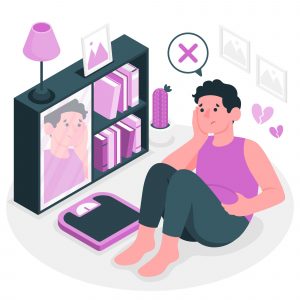Did you ever feel like you are suffering from an eating disorder but was never really sure if that was the case? Learn about what eating disorders are and find out whether you are suffering from one. If you are, it is good to seek help early and change your eating habits.
Eating disorders are mental health illnesses that manifest as problematic eating, exercising, or body image-related obsessions, compulsions, and behaviours. They have an impact on people of all ages, races, socioeconomic statuses, and sexual orientations. They are the deadliest mental illnesses, and they can have severe bodily repercussions like osteoporosis, stomach ruptures, and Type II Diabetes Mellitus.

Contrary to popular belief, eating disorders are much more complex than the fixation with thinness. It is believed that a mix of biological, psychological, and social factors led to them. Many people who suffer from eating disorders often struggle with other types of addictions, PTSD, despair, and anxiety. There is a high prevalence of trauma, particularly sexual trauma, among those with eating problems.
Although in American society, dieting, poor eating, and body image issues are frequently disregarded and even encouraged, many of these practices will eventually develop into eating disorders. Any symptoms that are interfering with how you live your life and function must be treated. There is no minimum level of severity or weight at which someone must be in order to qualify for assistance or support.
Anorexia, bulimia, binge eating disorder, and Other Specified Feeding or Eating Disorder (OSFED), formerly known as Eating Disorder Not Otherwise Specified (EDNOS), are the most prevalent eating disorders. Restricting food intake, excessive exercise, self-induced vomiting, laxative misuse, and episodes of overeating where the person feels out of control are all signs of eating disorders. Many people exhibit behaviours that are across eating disorders or change eating disorders during the course of their lives.

Despite the complexity of eating problems, recovery is achievable. The earlier someone receives assistance, the better, for both their physical and psychological rehabilitation. Individuals can and do go on to lead lives with healthy relationships to food and exercise with the help of services and support that can include a therapist, dietitian, psychiatrist, support groups, and/or primary care physician. Hence, if you feel like you are suffering from eating disorders, seek help early and you can still lead a healthy life.

